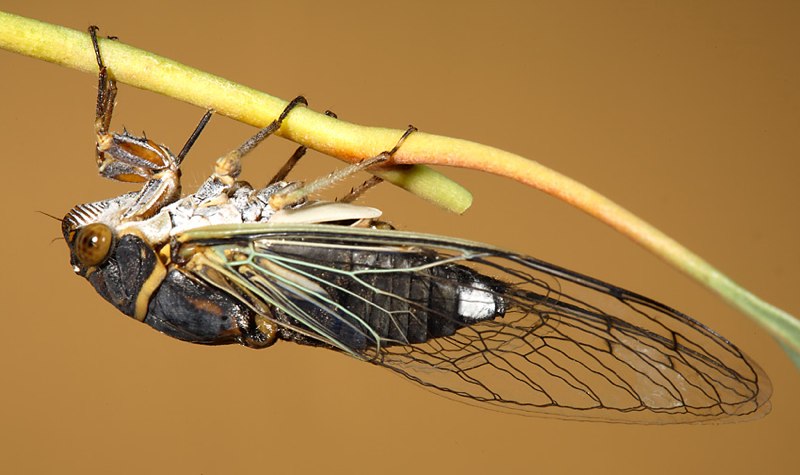Diceroprocta apache (Davis, 1921) aka Citrus Cicada:

Photo by Adam Fleishman.
See all Diceroprocta apache photos and information on cicadamania.com.
Song
Source: ©Insect Singers | Species: D. apache
Video Playlist
Playlists contain multiple videos found on YouTube:
Name, Location and Description
- Cicada Name: Diceroprocta apache (Davis, 1921)
- Short Name: D. apache
- Common Name: Citrus Cicada
- When: June-September. Peaks in July.
- Where it is found: AZ, CA, CO, NV, UT
- Maps: Biogeography of the Cicadas (Hemiptera: Cicadidae) of North America, North of Mexico [PDF]
- Description: Black and beige.
- Eye Color: red or beige
- Pronotal Collar Color: beige
- Identification: Bug Guide
- Identification: iNaturalist
- Type Specimen Details: The American Museum of Natural Species
- Website: Firefly forest
- Taxonomic Information: Insect Singers
Descriptions from Wm. T. Davis from RECORDS OF CICADAS FROM NORTH AMERICA WITH DESCRIPTIONS OF NEW SPECIES1
Note: at the time Davis assigned Diceroprocta apache to the Tibicen Latreille, 1825 genus. It’s since been moved to Diceroprocta Stål, 1870.
Resembles Tibicen cinctifcra (Uhler), but has sharper pointed opercula, the outer sides of which are not parallel, but converge; is without the central pruinose spot at the base of the tergum, and instead of having the dorsal part of segment eight all pruinose, the whitened area is reduced to two spots with a black space between. In the allotype the plates that correspond to the opercula of the male, are sharper pointed than in cinctifcra, the double notch in the last ventral segment is usually deeper, the terminal spine is more robust, that is, has a broader base, and the abdomen is less tapering at the extremity. In the three types of Uhler’s cinctifcra in the United States National Museum, the costal margin of the fore wing is bright orange to the end of the radial cell, also the hind margin of the pronotum or collar, whereas in apache the color is light yellow or straw-color. The membranes at the base of both pairs of wings are orange or at least usually much darker than in apache, where they are white or light gray. Some of these differences in strudture and color are more clearly brought out in the illustrations.
Classification:
Family: Cicadidae
Subfamily: Cicadinae
Tribe: Cryptotympanini
Subtribe: Cryptotympanina
Genus: Diceroprocta
Species: Diceroprocta apache (Davis, 1921)
List of sources
- Davis, W.T. 1921. RECORDS OF CICADAS FROM NORTH AMERICA WITH DESCRIPTIONS OF NEW SPECIES. Journal of the New York Entomological Society. Vol XXIX, No. I. Read it on archive.org.
- Full Binomial Names: ITIS.gov
- Common names: BugGuide.net; The Songs of Insects by Lang Elliott and Wil Herschberger; personal memory.
- Locations: Biogeography of the Cicadas (Hemiptera: Cicadidae) of North America, North of Mexico by Allen F. Sanborn and Polly K. Phillips.
- Descriptions, Colors: personal observations from specimens or photos from many sources. Descriptions are not perfect, but may be helpful.
Notes:
- Some descriptions are based on aged specimens which have lost some or a lot of their color.
5 replies on “Diceroprocta apache (Davis, 1921) aka Citrus Cicada”
Crafts? Like glue them on something?
I noticed the ones I collected in Indian Wells, CA have more of a green hue towards the base of the wings. It seems to match the description pretty well.
I’ve been collecting them for crafts but wanted to identify them.
Know anyone collecting specimens?
I have a variety of colors out here.
Is this bug poisoning to humans??
Neither venomous or poisonous, although there’s no guarantee that eating on won’t make you sick — everyone has their own personal set of allergies. I personally get gout when I eat shrimp — insects are closely related to other arthropods like shrimp, so I wouldn’t eat a cicada because of that.
LOL Nice.